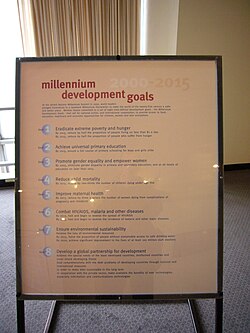目标
此条目可参照英语维基百科相应条目来扩充。原因:可以先翻译英文条目的Goal setting和Personal goals。 |
“目标”,是一种个人或是组织想要达到的结果,而且会为此计划,为达成目标而努力[1]。目标是个人或组织在某种理想状态下希望达到的状态。有时目标会有其期限,因此还需要在期限完成才算是达到目标。
目标可以是短期的,也可以是长期的。
目标设定
[编辑]
目标设定理论是依观察研究为基础形成,是组织心理学中的重要理论之一[2] Edwin A. Locke和Gary P. Latham是目标设定理论的创建者,他们在2002年针对此理论的核心内容进行了全面的回顾[3]。简单来说,Locke和Latham发现特定、困难的目标所带来的成就比简单的目标,或是“尽力而为”的指示要好。只要提供关于进展的反馈,人会尽力达到目标,而且人有完成此任务的能力以及知识。
依照Locke和Latham所述,目标会以以下四种方式影响其成就[3]:
- 目标会将专注以及努力导向和目标相关的活动。
- 困难的目标会带来较多的努力。
- 目标可以增加坚持,困难的目标让人可以有较持续的努力
- 目标间接的会让人发现和使用和任务相关的知识和策略。
有些教练会建议设定具体的(specific)、可衡量的(measurable)、可实现的(attainable)、合理的(realistic)及有时间目标的(time-targeted)(SMART)的目标,不过不是所有的研究者都同意此原则)[4]。SMART原则没有将任务的难度列入考虑,在 Locke和Latham的目标设定理论中,建议以以往进行过任务的平均表现为准,选择困难度在90%的任务[5][3]。
个人目标
[编辑]人们可以设定个人目标:像学生的目标可能是考试有好成绩,运动员的目标可能是每天跑五英里,旅游者的目标可能是在三小时内到达目的城市,人们也会设法达到为退休的储蓄或是为特定目的预备经费的财务目标。
管理目标可以在个人生活的各方面都有助益。精确的了解个人想要什么,有助于澄清要专注的事物,并且在此提升,因此会有意识的优先处理目标相关事物。不过,持续的目标调整,也就是目标解离(goal disengagement)和目标再承诺(goal re-engagement)的能力,也是健康人生的一部分[6]
目标设定和计划可以带来长期的愿景、中程的使命及短期的动机,可以集中意图、欲望,获取知识,并且有助于组织相关资源。
有效的目标设定和计划也包括认知和处理所有会破坏努力的内疚、内在冲突以及限制性的信念。透过设定清楚定义的目标,之后可以衡量目标实现的程度,可以从这些漫长也可能困难的过程中看到其进程。
参考文献
[编辑]- ^ Locke, Edwin A.; Latham, Gary P. A theory of goal setting & task performance. Englewood Cliffs, NJ: Prentice Hall. 1990. ISBN 978-0139131387. OCLC 20219875.
- ^ Miner, J. B. The rated importance, scientific validity, and practical usefulness of organizational behavior theories: A quantitative review. Academy of Management Learning & Education. 2003, 2 (3): 250–268. doi:10.5465/amle.2003.10932132.
- ^ 3.0 3.1 3.2 Locke, Edwin A.; Latham, Gary P. Building a practically useful theory of goal setting and task motivation: a 35-year odyssey. American Psychologist. September 2002, 57 (9): 705–717 [2002]. CiteSeerX 10.1.1.126.9922
 . PMID 12237980. S2CID 17534210. doi:10.1037/0003-066X.57.9.705.
. PMID 12237980. S2CID 17534210. doi:10.1037/0003-066X.57.9.705.
- ^ Grant, Anthony M. An integrated model of goal-focused coaching: an evidence-based framework for teaching and practice (PDF). International Coaching Psychology Review. September 2012, 7 (2): 146–165 (147). S2CID 255938190. doi:10.53841/bpsicpr.2012.7.2.146. (原始内容 (PDF)存档于2014-11-29).
Whilst the ideas represented by the acronym SMART are indeed broadly supported by goal theory (e.g. Locke, 1996), and the acronym SMART may well be useful in some instances in coaching practice, I think that the widespread belief that goals are synonymous with SMART action plans has done much to stifle the development of a more sophisticated understanding and use of goal theory within in the coaching community, and this point has important implications for coaching research, teaching and practice.
- ^ Locke, E. A., Chah, D., Harrison, S. & Lustgarten, N. Separating the effects of goal specificity from goal level. Organizational Behavior and Human Decision Processes. 1989, 43 (2): 270–287. doi:10.1016/0749-5978(89)90053-8.
- ^ Wrosch, Carsten; Scheier, Michael F.; Miller, Gregory E. Goal Adjustment Capacities, Subjective Well-Being, and Physical Health. Social and Personality Psychology Compass. 2013-12-01, 7 (12): 847–860. ISSN 1751-9004. PMC 4145404
 . PMID 25177358. doi:10.1111/spc3.12074.
. PMID 25177358. doi:10.1111/spc3.12074.
